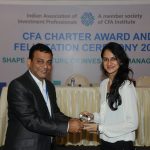- February 20, 2016
- Posted by:
- Category:Bengaluru, BLOG, Careers, Events, Speaker Events

Contributed by: Neelabh Mishra
Panelists: Shalini Pillay, Head HR, KPMG India; Teena Malhotra, Head of Human Resources, Northern Operating Services Pvt. Ltd.; Ravi Raman, Chief Operating Officer, Infrahedge (a State Street subsidiary); Veena Avadhanam, Director New Investments, Mumbai Angels;
Moderator: Vivek Pai, CFA
On the first question about how important it is to have a specific Qualification for getting a position?
This was an interesting topic with differing views on the subject. The HR professionals, Shalini and Teena, were of the opinion that qualifications played a limited role for applicants at their respective firms. They were of the view that a qualification serves as a ‘hygiene factor’ rather than a deal-breaker, and that its importance reduces as one gains experience. However Ravi and Veena stressed on the importance of a qualification as they believe that it serves as a ‘Statement of Intent’ and a testament to the dedication and discipline shown by a candidate towards a professional career.
A few minutes into the discussion, the panel agreed that Qualifications are a vital component of a candidate’s profile as it is representative of a disciplined and dedicated approach towards achieving one’s professional aspirations. At the same time, they believe that a person’s qualifications must make sense as part of the larger coherent story. They must not, at any point, appear to be random acts of mere ‘trophy collection’. Ravi ended the discussion by stating that Qualifications are a double-edged sword – If one wants to dress his/her resume with a pretty title, they should be ready to back it up with solid knowledge, as the interview questions may in fact be more difficult.
In response to a question on candidates’ motives for pursuing an Educational Qualification (It could either be to learn about the field or get a certification that helps them get their foot in the door)
The panel was of the view that the motives of a candidate must add up as part of a larger story and should be relevant to the job profile one is seeking. While getting an educational qualification solely to prove one’s worth, may appear negative, it would be viewed favorably as long as one could back it up with the right skills and knowledge. The inability to justify one’s motives or the lack of knowledge and skill that a qualification represents, may however be viewed as ‘Trophy Collection’.
On the question about whether organizations today encourage the dominant view that qualifications are all important by offering different compensations based on Educational degrees?
Shalini and Teena stated that compensation was determined by factors such as supply and demand, role criticality and/or mandatory requirement of some technical qualifications. Some roles may demand specific skills i.e an auditing firm requiring CAs who would then be paid based on demand and supply. On the other hand, some roles like management consulting could be generic and suitable for people with different backgrounds. So the correlation between Pay and Qualification may or may not be strong depending on the role and industry in question.
On the question regarding the need for continuous education for professionals?
The panel agreed that continuous education was extremely vital. To keep one’s qualifications relevant, work roles must be relevant to what professionals have studied in the past or they risk losing their ability to justify the qualification. At the same time, staying up to date with the latest developments in a field can be crucial. Teena expanded on this by stating that as a professional, paying close attention to the development of soft skills and broadening one’s perspective towards different work cultures was a necessity. She believes that beyond a point, besides technical expertise, soft skills and wider world-view become more important in the ‘growth’ of a professional.
The Q&A session had some interesting questions from the audience. Upon being asked about the surprising importance being given to Qualifications at job interviews based on the experiences of one of attendees at the event, the panel, though reluctantly, admitted that this was possible in large sections in India and the best way to go would be to balance it out. The Panel was also optimistic about the changes underway- just like in the west, the importance of a mere title would reduce
Another relevant question about the importance of a Brand (Previous employer or educational instuition) on a resume saw the panel divided.
Teena and Shalini believed that the body of work and relevance to a particular role were more important. On the other hand, Veena was of the view that employers clearly did care about which brand one was associated with in the past and that is the reality of things. Ravi quipped that even though a brand had nothing to do with an individual’s capabilities, he could not disagree with Veena that the on-ground reality was quite different.
Finally, the panelists were requested for their thoughts about the additional challenges women face and the lack of diversity in finance. In response, the panel agreed with Shalini’s observations that at the entry-level of KPMG, the gender ratio was close to 50%, while at Manager-level and above, this ratio is far lower. The Panel while disappointed with the current situation was very optimistic about positive changes on this aspect.
-NM










